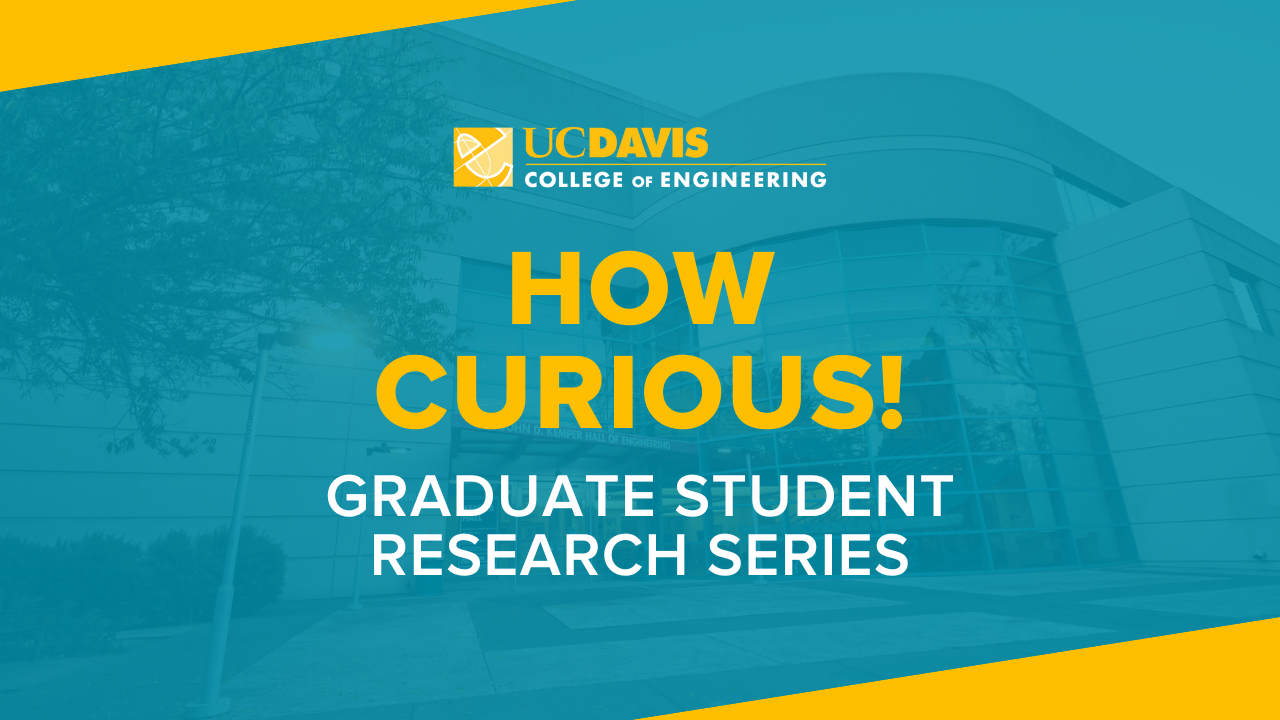
Event Date
How Curious! offers graduate students in master's and Ph.D. programs in the College of Engineering an opportunity to present their research findings and engage in scholarly discussions with their peers and faculty members. The goal is to foster collaboration, encourage intellectual exchange and support the professional development of our graduate student community.
Presenters
Mansha Dubey, Materials Science and Engineering
Presenting: Humidity driven response of charge carrier lifetimes in halide perovskites
Halide perovskites are strong contenders in becoming the next leading photovoltaic and light emitting technology. Despite the strong promise, the lack of stability under long-term exposure to environmental stressors such as heat, humidity, and illumination remains an obstacle in the wide scale adoption of perovskites as solar cells. Trap states in the electronic band structure due to the presence of defects can limit charge carrier mobilities inhibiting the performance of optoelectronic devices. We investigate the impact of relative humidity on the minority carrier lifetimes of Cs/FA metal halide families of compositions by means of in situ time-resolved photoluminescence. We demonstrate enhancement in charge carrier lifetimes with increasing exposure to relative humidity from ~10ns to ~100ns, at very low fluences where trap-mediated effects are most prominent, indicating passivation of defects and consequent elimination of trap states. Additionally, we explore the effects of changing the halide composition from I to Br on the carrier lifetimes. Our results reveal shorter lifetimes in Br rich films suggesting lower crystallinity and higher density of trap states compared to I rich films. Upon exposure to humidity, Br rich films exhibit a more profound increase in lifetime showing a stronger interaction with water. This work provides critical insight into the dependence of charge carrier recombination on interactions with moisture in hybrid I-Br tunable perovskites.
Bio: Mansha is a third-year Ph.D. student in the Materials Science and Engineering department, advised by Prof. Marina Leite. Her research focuses on the charge carrier dynamics in halide perovskites studied through optical characterization.
Yuankai Zhu, Mechanical and Aerospace Engineering
Presenting: Scheduling and Trajectory Planning for Multiarm Harvesters
Facing seasonal labor shortages in California, particularly in the hand harvesting of fresh fruits and vegetables, this project proposes efficient scheduling and motion planning algorithms for multi-arm robotic fruit harvesters as a cost-effective replacement for human labor. The key to reducing costs lies in optimizing the robots' picking speed and efficiency, which can be compromised by non-uniform fruit distributions and the potential underutilization of robotic arms. This study addresses these challenges by integrating high-level scheduling with low-level collision-free motion planning within a bi-level optimization framework, traditionally approached separately due to their complexity.
Bio: Yuankai Zhu is a third-year Ph.D. student in the Department of Mechanical and Aerospace Engineering, advised by Professor Stavros Vougioukas. Their research focuses on autonomy in agriculture. Yuankai is also interested in UAVs, autonomous vehicles and robotics.
Siddharth Sonti, Chemical Engineering
Presenting: Elucidating the fluxionality and dynamics of zeolite-confied Au nanoclusters using machine learning potentials
Sub-nanometric clusters (NCs) of transition metal (TM) atoms, typically consisting of fewer than 15 atoms, have exhibited remarkable catalytic activity in various industrial reactions. However, these NCs are thermodynamically unstable and susceptible to deactivation due to sintering. Previous experiments have proposed zeolites as effective structural scaffolds to stabilize small NCs. However, key physiochemical phenomena such as fluxionality and diffusion properties of such zeolite-confined TM NCs (TM@zeolites) are not well understood. The central challenge is the steep computational cost associated with performing sufficiently long ab initio molecular dynamics (AIMD) simulations. As a step towards addressing this challenge, we developed a self-adaptive workflow that leverages two state-of-the-art machine learning potential (MLP) packages (i.e., SchNetPack and neuroevolution potential) to develop an accurate, robust, and transferable MLP for a prototypical Au@zeolite system. The resulting MLP, which is shown to be transferable across several other zeolites and various temperatures, is used to determine the free energy landscape and the corresponding rates for the diffusion of gold NCs in LTA zeolites
Bio: Siddharth joined UC Davis as a PhD student after finishing his B.S. in Chemical Engineering from the Institute of Chemical Technology, Mumbai in 2022. He is co-advised by Prof. Surl-Hee (Shirley) Ahn and Prof. Ambarish Kulkarni. His current research is centered on the integration of machine learning and enhanced sampling methods to investigate a range of catalytic and enzyme systems, with a particular emphasis on developing sustainable technologies.
